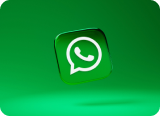WhatsApp Business API Pricing Calculator
- WhatsApp Business API has a conversation-based pricing model, with each category of conversation priced differently
- A conversation includes all messages exchanged between a business and a consumer in a 24-hour session
- Sending multiple templates of the same category within an open conversation does not lead to additional charges
- In case of multiple conversations spanning different categories, charges are based on the template category
- Meta can change the template category if they feel it doesn’t fit their definition of that particular category
Marketing Conversations
![[icon]](data:image/svg+xml,%3Csvg%20xmlns='http://www.w3.org/2000/svg'%20viewBox='0%200%201%201'%3E%3C/svg%3E) For all messages related to promotions, offers, informational updates, or invitations for customers to respond / take action
For all messages related to promotions, offers, informational updates, or invitations for customers to respond / take action
![[icon]](https://edna.io/wp-content/themes/edna/images/information.svg) For all messages related to promotions, offers, informational updates, or invitations for customers to respond / take action
For all messages related to promotions, offers, informational updates, or invitations for customers to respond / take action
Utility Conversations
![[icon]](data:image/svg+xml,%3Csvg%20xmlns='http://www.w3.org/2000/svg'%20viewBox='0%200%201%201'%3E%3C/svg%3E) For all messages related to account updates, order updates, loyalty program updates, payment receipt notifications, money transfer confirmations, etc.
For all messages related to account updates, order updates, loyalty program updates, payment receipt notifications, money transfer confirmations, etc.
![[icon]](https://edna.io/wp-content/themes/edna/images/information.svg) For all messages related to account updates, order updates, loyalty program updates, payment receipt notifications, money transfer confirmations, etc.
For all messages related to account updates, order updates, loyalty program updates, payment receipt notifications, money transfer confirmations, etc.
Authentication Conversations
![[icon]](data:image/svg+xml,%3Csvg%20xmlns='http://www.w3.org/2000/svg'%20viewBox='0%200%201%201'%3E%3C/svg%3E) For authenticating users with one-time passcodes as in the case of account verification, account recovery, transaction authorization, integrity challenges, etc.
For authenticating users with one-time passcodes as in the case of account verification, account recovery, transaction authorization, integrity challenges, etc.
![[icon]](https://edna.io/wp-content/themes/edna/images/information.svg) For authenticating users with one-time passcodes as in the case of account verification, account recovery, transaction authorization, integrity challenges, etc.
For authenticating users with one-time passcodes as in the case of account verification, account recovery, transaction authorization, integrity challenges, etc.
Estimate:
$0.00
Want WhatsApp Business Now? We Can Help!
How to Identify Each Template Category?
FAQs
What is a conversation? When does the 24-hour conversation window start?

A conversation includes all messages delivered in a 24-hour session. A conversation starts when the first business message in a conversation is delivered, either initiated by the business or in reply to a user’s message.
How does a WhatsApp pricing calculator help?

The cost per conversation varies by country or region. Prices also vary depending on the conversation category. Also, the pricing of the solution providers often varies, especially their installation fee, monthly fee, etc. Using the WhatsApp pricing calculator helps you estimate the charges you are likely to incur if you use the API.
How many free conversations are businesses eligible for each month?

Effective November 1st, all service conversations on WhatsApp Business API will be free of charge.
How are multiple conversation categories charged?

Conversations are charged based on the template category. When a template is delivered, it opens a new conversation of that category and incurs the charge of that conversation category, unless the template is delivered during an open conversation of that category. For example, if a utility conversation is open and a marketing template is delivered within that open conversation, a new, separate marketing conversation is opened and the marketing conversation charge is initiated.
Are businesses charged for every message in a conversation?

For inbound conversations, businesses are not charged for conversations that take place within a 24-hour period from the time of the first message. Businesses can respond to their customers with non-templated, free-form messages for free during this period. However, during this time, if the business replies to a user with a template message or sends a template message in an open service conversation, this opens up a new conversation based on the template category for which the business will be charged. For outbound conversations, businesses are charged depending on how many messages they send to a user outside the 24-hour customer service window. The cost of these messages varies based on the message length as well as the country.
How does WhatsApp understand whether a business sends a free-form or template message during an ongoing user-initiated conversation?

Based on whether the message corresponds to the registered template. If a message corresponds to the registered template, WhatsApp considers it as a template message.
What are free entry point conversations?

When users use CTA buttons on Click to WhatsApp ads and are redirected to the WhatsApp channel, the first conversation that users initiate with businesses here are not charged. However, subsequent conversations with the user are charged. Free entry-point conversations can only be initiated by the user. Free conversations are extended from 24 hours up to 72 hours when users message businesses through these entry points.
What are some best practices to use template categories most judiciously?

1. Select the correct category when you register a new template. Else, WhatsApp may change the category of the template as they see fit.
2. Plan your budget based on the registered category of the template.
3. Use free-form (non-template) message if you want to send notifications while 24-hour user-initiated conversation is still going on. That way, you will avoid paying extra for additional business-initiated conversations.
4. Use interactive messages (reply buttons and interactive menu) if you want to send buttons to a client within the ongoing chat. That way, you will avoid paying extra for additional business-initiated conversations.
2. Plan your budget based on the registered category of the template.
3. Use free-form (non-template) message if you want to send notifications while 24-hour user-initiated conversation is still going on. That way, you will avoid paying extra for additional business-initiated conversations.
4. Use interactive messages (reply buttons and interactive menu) if you want to send buttons to a client within the ongoing chat. That way, you will avoid paying extra for additional business-initiated conversations.





